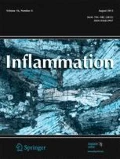Abstract
To investigate the effect of morphine on T helper lymphocyte differentiation and PI3K/AKT pathway mechanism, CD4+ lymphocytes were treated by phorbol-myristate-acetate (25 ng/ml) (PMA) plus ionomycin (1 μg/ml) in the presence of various concentrations of morphine (25, 50, 100, 200 ng/ml) for 4 h. Th1 and Th2 subsets, supernatant cytokines, and PI3K, AKT, and protein kinase C-theta (PKC-θ) levels were detected. The Th1 cell percentage, Th1-derived cytokines, and ratio of Th1/Th2 decreased in the presence of morphine in a concentration-dependent manner. However, Th2 cell percentage kept stable after morphine treatment. The phosphorylation of PI3K and AKT decreased, but the phosphorylation of PKC-θ did not change in the presence of morphine. The decreased percentage of Th1 cells and ratio of Th1/Th2 was recovered by naloxone concentration-dependently. Morphine can inhibit the differentiation of Th1 lymphocytes and decrease the ratio of Th1/Th2 via the pathway of PI3K/AKT. The effect can be inhibited by naloxone.






Similar content being viewed by others
References
Knutson, K.L., and M.L. Disis. 2005. Tumor antigen-specific T helper cells in cancer immunity and immunotherapy. Cancer Immunology, Immunotherapy 54: 721–8.
De Monte, L., M. Reni, E. Tassi, et al. 2011. Intratumor T helper type 2 cell infiltrate correlates with cancer-associated fibroblast thymic stromal lymphopoietin production and reduced survival in pancreatic cancer. The Journal of Experimental Medicine 208: 469–78.
Tosolini, M., A. Kirilovsky, B. Mlecnik, et al. 2011. Clinical impact of different classes of infiltrating T cytotoxic and helper cells (Th1, th2, treg, th17) in patients with colorectal cancer. Cancer Research 71: 1263–71.
Ubukata, H., G. Motohashi, T. Tabuchi, et al. 2010. Evaluations of interferon-γ/interleukin-4 ratio and neutrophil/lymphocyte ratio as prognostic indicators in gastric cancer patients. Journal of Surgical Oncology 102: 742–7.
Pollizzi, K.N., and J.D. Powell. 2014. Integrating canonical and metabolic signalling programmes in the regulation of T cell responses. Nature Reviews Immunology 14: 435–46.
Ding, R., J. Tang, H. Gao, et al. 2012. New methymycin derivatives of Streptomyces venezuelae ATCC 15439 and their inhibitory effects on human T cell proliferation mediated by PMA/ionomycin. Archives of Pharmacal Research 35: 1567–72.
Gao, M., J. Sun, W. Jin, et al. 2012. Morphine, but not ketamine, decreases the ratio of Th1/Th2 in CD4-positive cells through T-bet and GATA3. Inflammation 35: 1069–77.
Kraus, J. 2012. Expression and functions of μ-opioid receptors and cannabinoid receptors type 1 in T lymphocytes. Annals of the New York Academy of Sciences 1261: 1–6.
Madishetti, S., N. Schneble, C. König, et al. 2014. PI3Kγ integrates cAMP and Akt signalling of the μ-opioid receptor. British Journal of Pharmacology 171: 3328–37.
Higuchi, S., M. Ii, P. Zhu, et al. 2012. Delta-opioid receptor activation promotes mesenchymal stem cell survival via PKC/STAT3 signaling pathway. Circulation Journal 76: 204–12.
Cook, K.D., and J. Miller. 2010. TCR-dependent translational control of GATA-3 enhances Th2 differentiation. Journal of Immunology 185: 3209–16.
Chen, H., T. Fu, W.K. Suh, et al. 2014. CD4 T cells require ICOS-mediated PI3K signaling to increase T-Bet expression in the setting of anti-CTLA-4 therapy. Cancer Immunologic Research 2: 167–76.
Gao, M., W. Jin, Y. Qian, et al. 2011. Effect of N-methyl-D-aspartate receptor antagonist on T helper cell differentiation induced by phorbol-myristate-acetate and ionomycin. Cytokine 56: 458–65.
Lee, K., P. Gudapati, S. Dragovic, et al. 2010. Mammalian target of rapamycin protein complex 2 regulates differentiation of Th1 and Th2 cell subsets via distinct signaling pathways. Immunity 32: 743–53.
Marsland, B.J., T.J. Soos, G. Späth, et al. 2004. Protein kinase C theta is critical for the development of in vivo T helper (Th)2 cell but not Th1 cell responses. The Journal of Experimental Medicine 200: 181–9.
Zhang, L., J.S. Belkowski, T. Briscoe, et al. 2012. Regulation of mu opioid receptor expression in developing T cells. Journal of Neuroimmune Pharmacology 7: 835–42.
Roy, S., F. Ethuin, C. Bourgeois, et al. 2004. Chronic morphine treatment differentiates T helper cells to Th2 effector cells by modulating transcription factors GATA 3 and T-bet. Journal of Neuroimmunology 147: 78–81.
Hammoud, H.A., G. Aymard, P. Lechat, et al. 2011. Relationships between plasma concentrations of morphine, morphine-3-glucuronide, morphine-6-glucuronide, and intravenous morphine titration outcomes in the postoperative period. Fundamental and Clinical Pharmacology 25: 518–27.
Greeneltch, K.M., A.E. Kelly-Welch, Y. Shi, et al. 2005. Chronic morphine treatment promotes specific Th2 cytokine production by Murine T cells in vitro via a Fas/Fas ligand-dependent mechanism. The Journal of Immunology 175: 4999–5005.
Roy, S., J. Wang, R. Charboneau, et al. 2005. Morphine induces CD4+ T cell IL-4 expression through an adenylyl cyclase mechanism independent of the protein kinase a pathway. Journal of Immunology 175: 6361–6367.
Acknowledgments
Dr. Jie Sun is an assistant fellow at the collaborative innovation center for cardiovascular disease translational medicine. We thank Genbao Feng, from Nanjing University, P.R. China, for his technical assistance.
Author information
Authors and Affiliations
Corresponding author
Ethics declarations
Conflict of interest
The study was supported by the National Natural Science Foundation of China (no. 30801068). This study was also supported by A Project Funded by the Priority Academic Program Development of Jiangsu Higher Education Institutions (PAPD). We do not have any other competing interest.
Rights and permissions
About this article
Cite this article
Mao, M., Qian, Y. & Sun, J. Morphine Suppresses T helper Lymphocyte Differentiation to Th1 Type Through PI3K/AKT Pathway. Inflammation 39, 813–821 (2016). https://doi.org/10.1007/s10753-016-0310-x
Published:
Issue Date:
DOI: https://doi.org/10.1007/s10753-016-0310-x




